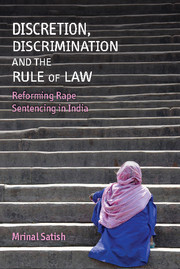Description
Discretion, Discrimination and the Rule of Law
Reforming Rape Sentencing in India
Author: Satish Mrinal
Language: English
Subject for Discretion, Discrimination and the Rule of Law:
Approximative price 100.30 €
In Print (Delivery period: 14 days).
Add to cart
Publication date: 11-2016
316 p. · 15.7x23.7 cm · Hardback
316 p. · 15.7x23.7 cm · Hardback
Description
/li>Contents
/li>Biography
/li>
This book addresses and analyses the rape sentencing regime in India, and demonstrates that despite law reform, the myths and stereotypes about rapists and rape victims that used to be embedded in the positive law of rape and/or in evidence law have, in many cases, merely shifted from the charging and trial stages to the sentencing stage. The book further argues that rape myths and stereotypes influence sentencing, leading to unwarranted disparity. It undertakes a theoretical examination of the purposes of punishment, the fundamentally overlapping nature of the stages of the criminal process, and the meaning of 'disparity'. The book sets forth what the sentencing guidelines for rape in India might provide, discussing factors that should be considered relevant and irrelevant in the sentencing of rape offenders. The underlying theme of the book is to bring the rule of law to criminal sentencing in India.
1. Introduction; 2. An introduction to the Indian criminal justice system; 3. The law and practice of rape adjudication in India; 4. Rape sentencing: an empirical analysis; 5. Myths and stereotypes in rape prosecutions; 6. Structuring sentencing discretion: guideline models and approaches; 7. Sentencing discretion in India: the need for structuring; 8. Sentencing guidelines for rape.
Mrinal Satish is Associate Professor of Law and Executive Director of the Centre for Constitutional Law, Policy and Governance at the National Law University, Delhi. His research interests are sentencing, gender and the law, medical jurisprudence, empirical analysis of law, excessive undertrial and pre-trial detention, and studying the impact of the criminal justice system in its interface with vulnerable and disempowered groups.
© 2024 LAVOISIER S.A.S.
These books may interest you

SentencingTime for a Paradigm Shift 178.41 €



